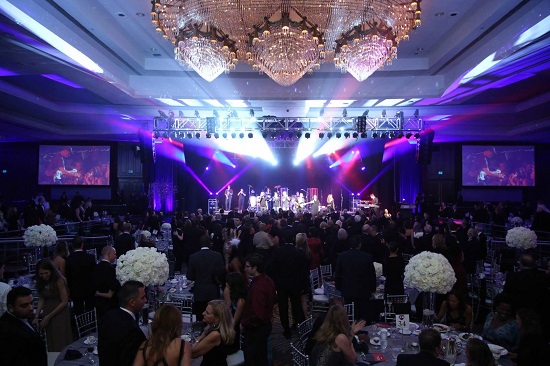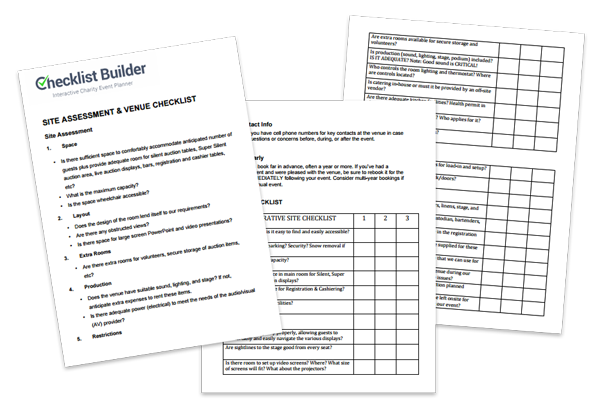 At Winspire News, we are passionate about helping nonprofits generate as much profit as possible from their fundraising events. To do so, we often focus on strategies for nonprofits to increase revenue, but today we’re going to look at a way to trim costs.
At Winspire News, we are passionate about helping nonprofits generate as much profit as possible from their fundraising events. To do so, we often focus on strategies for nonprofits to increase revenue, but today we’re going to look at a way to trim costs.
One of the biggest expenses in organizing a charity fundraising event is the cost of renting an off-site venue. The venue you choose is important; the space sets the tone for the night and goes a long way to making donors feel comfortable, entertained and eager to support your cause.
You want a place that’s big enough to hold all your donors, plus glamorous enough to feel like a night on the town…without gobbling up all your hard-earned auction earnings.
Are you getting the best deal for your venue?
In this two-part series, learn how to assess venue options, chip away at venue costs and negotiate even better service in return. (The best part: You don’t need to be a tough-as-nails negotiator to benefit from these ideas!)
Step 1: Outline your event needs
As soon as possible before your event, you’ll want to appoint a chairperson to oversee logistics of the event like venue and catering. This person would ideally have experience in event planning or hospitality, but more importantly they should pay attention to details and be willing to closely review contract terms and conditions. They will lead the way in assessing sites for your event.
Once your venue team is in place, gather together with event leadership and confirm the following information:
1. Event date. Many venues book far in advance, often a year or more, so you’ll want to get moving as early as possible. Having options will be your main leverage throughout negotiations, so try and come up with 2 or 3 dates that might work for your audience. (If you only have one date, that’s fine, but inflexibility does give venues the pricing advantage.)
2. Audience size. Provide the low-end number of your expected attendance; high headcounts lead to higher estimates and higher minimum spending to utilize other services at the same venue (like catering).
3. Special requirements. This includes any chosen theme, the use of A/V equipment, WiFi, accessibility for all patrons, staff needed and so forth.
4. Budget. This need not be set in stone, as the point of negotiations is to hopefully drive down costs within striking distance. However it will save time for both you and the venue booking agent if your team can come up with a reasonable range, and your absolute “walkaway” number at which the venue is not affordable. Look at what you’ve spent in past years and try to find out what other nonprofits in your area are spending.
Step 2: Assess local venues
You’re now ready to reach out to some prospective venues. Call 8 to 10 venues in the area to discuss availability and their standard rates. The more quotes you gather, the better your ability to tell what’s reasonable and what’s not. You’ll also want to discuss your event requirements with a booking agent; if the venue cannot accomodate your needs as listed above, you can easily cross them off the list.
Once you’ve assembled a list of 3 to 5 options, it’s time to check out the venues in person. (Again the key to negotiation success is having options, so you’ll want at least 3 viable choices to pursue.) As with most event expenses, there’s a lot more to consider than price. We want to get the best deal for your money, not just the lowest cost.
Here are some other qualifications to look for when visiting suitable locations:
1. Space. Is there enough space to comfortably accommodate the anticipated number of guests, plus sufficient room for silent auction tables, a Super Silent auction area, live auction displays, bars, registration and cashier tables, volunteers and more? What is the maximum capacity of the room?
{{cta(‘f5276871-e571-457e-b33f-509d9ad06987′,’justifycenter’)}}
2. Layout. Finding a facility that has adequate capacity is just the start. Does the design of the room lend itself to a live auction, including space for a large PowerPoint projector screen and video presentations?
3. Production. Does the venue offer suitable A/V equipment, sound, lighting and staging? (If not, the quote should be lower. Anticipate extra expenses to rent these items.)
4. What is included in the rental fee? Look for everything from tables and chairs, linens, staging, insurance, clean restrooms, bars, on-site staff, guest parking and more. (For more on decorating the venue, read “4 Practical Tips for Decorating Your Fundraising Auction.”) If you’re required to work with their in-house vendors, get quotes for these services as well.
5. Other bookings. Are there other events happening at the venue at the same time as your event? If so, find out if this could possibly interfere with the service you receive, noise levels and so forth.
6. Referrals. Ask the venue to provide references, preferably from other nonprofit fundraising events or charity auctions. If the organization and event are around the same size as yours, you’ll probably receive similar service and a fair deal.
Don’t be afraid to think outside the box when looking for a venue. A big change-up, like moving your event outdoors, to a restaurant or downtown, keeps the annual gala fresh and interesting. Your options are limited only by your imagination.
Step 3: Consider Your Advantages
You’ve established yourself as an interested customer at the venue. Now it’s almost time to start negotiating the price and services.
I mentioned you don’t need to be an immovable haggler to benefit from negotiating. It’s absolutely true. You want to work with a venue that can meet you halfway…and they want to work with customers that are flexible and reliable. Whether this is your first year hosting this event or you’re a returning customer, it’s worth reminding the venue how they can benefit from your patronage, possibly for years to come.
Don’t dwell on what your nonprofit or event may lack—focus on what you bring to the table.
You may have the upper hand in negotiations if…
- You can provide a general figure of how much you spend on events each year. Quantifying the value of your business makes it harder for venues to risk you walking away.
- Your event offers valuable sponsorship opportunities. Offer to include the venue’s logo in flyers, programs and the auction catalog in exchange for a lower price.
{{cta(‘f2a7ad66-bc37-4f6f-ac57-1560c652588b’,’justifycenter’)}}
- Your event is widely publicized. The location will be mentioned in every promotional item you produce: the web site, flyers, social media posts, collateral and more. Let them know how many media impressions you had last year, all of which mentioned the previous venue directly or sent viewers to the event website.
- The venue is new. Lesser-known venues will realize your event is a great chance to show off their facilities to the greater community, while partnering with a charitable organization making a difference in the community. Not to mention they’ll be eager to start earning back some of their investment capital.
- You book multiple events annually, multiplying the potential revenue the venue will generate from one partnership.
- You have flexible dates. The venue’s number one goal is having reservations every day of the year, so being able to fill in a gap may lead to a significant discount.
Armed with this information, you’re ready to begin negotiating with confidence. Stay tuned for an upcoming guide to the give-and-take of venue negotiation that ultimately benefits all parties involved.
Calling all charity auction organizers – want more event venue tips? Try Checklist Builder FREE and instantly have access to 4 of the most important fundraising event production committees, which contain plenty of free sample event forms and templates to save hours of time.
If you like what you see, upgrade to an annual paid subscription for just $99 and unlock the Venue & Catering Committee. You’ll find our Site Assessment Worksheet, a PDF with over 30 questions to ask when assessing a site plus the ultimate Venue Checklist.
{{cta(‘ba326600-0d41-427d-9835-342fbadae3ec’,’justifycenter’)}}
